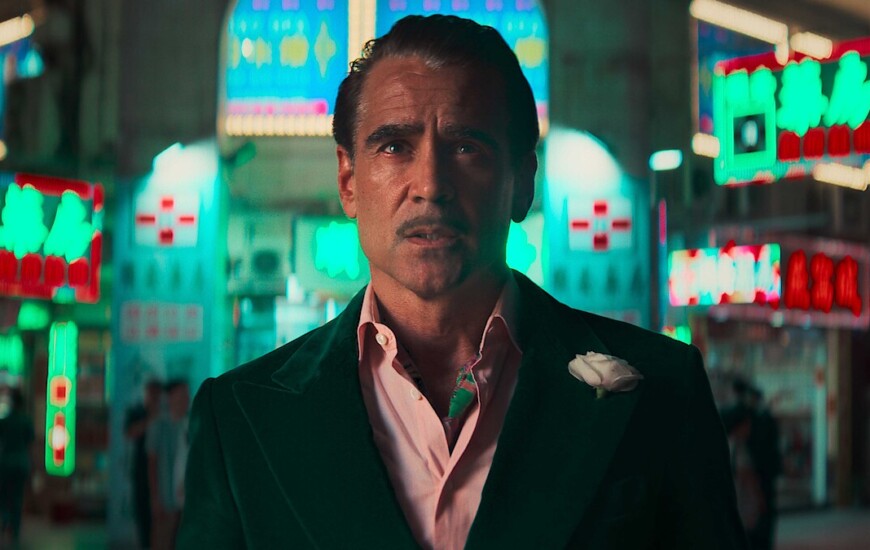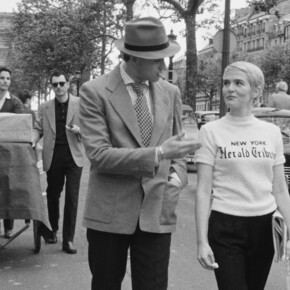Farrell’s Oscar hopes go bust in Ballad Of A Small Player
Mike Finnerty 29 Oct 2025
It is a riddle that film critics have been unable to answer since cinema was invented – does a good lead performance make up for a bad script?
We saw it with Julia Roberts in After The Hunt, and we saw it with Joaquin Phoenix in Joker, and now Dublin’s own Colin Farrell joins the elite club of great actors giving a performance the film doesn’t deserve.
With A Big, Bold, Beautiful Journey already committed to a pub quiz trivia question, Ballad Of A Small Player has now been positioned as Farrell’s rebound after that misstep.
Farrell’s stock has never been higher as a star, so the Dubliner being slotted into a buzzy Netflix thriller from the director of Conclave seems like a slam dunk.
The premise – Farrell stars as a gambler who is in over his head in Macau and has to win back a large sum of money – seems tailor-made for Farrell’s particular brand of charisma, and when the film sticks to the premise, it’s a fun, pulpy piece of filmmaking.
When the film attempts to go beyond surface-level thrills and dig into the character motivations or the world of the film, it falls apart.
Farrell stars as Lord Doyle, a suave, charming British gambler who lives out of hotel rooms, Alan Partridge-style, and can seemingly only find solace at the gambling table.
This month marks 10 years since Farrell starred in The Lobster, the film that unleashed Farrell as a performer.
There were high points early on in Farrell’s career (his breakout role in Tigerland, his dialled-up portrayal of Sonny Crockett in Miami Vice), but working with Yorgos Lantihmos unlocked something in Farrell.
After The Lobster, Farrell realised he was a 70s character actor trapped in the body of a dashing leading man, and he has used that to great effect.
In Bruges was the focal point of Farrell’s career, but The Lobster was what turned him from a good actor to a great one.
With this performance, Farrell uses the tricks we’ve come to expect from Farrell; he has the David Niven rougish charm that made him a star all those years ago, but he’s not afraid to dig a little deeper and reveal the innate anger and sadness that’s always bubbling underneath the surface.
The film is based on a 2014 novel of the same name by acclaimed British novelist Lawrence Osborne, and the film’s main issue stems from the screenplay being too literal of an adaptation.
Plot beats that might read well in a novel don’t translate well to film; the second act of the film, in particular, stops any momentum the film has built up dead in its tracks, and the third act can’t make up its mind about when it wants to end.
To his credit, Farrell is game for whatever the film throws at him, and the film flirts with being interesting when it explores the darker side of gambling, addiction and what separates a good talent from a great one.
Sadly, the script is strangely shapeless and has no sense of progression or flow, despite it having a built-in premise of Farrell’s character needing to pay back the debts he has built up.
Farrell is joined by the always-reliable Tilda Swinton as the other big name in the film, and Swinton is always reliable in the sense that you can rely on her to make any character she plays 50% more interesting on sheer presence alone.
Swinton can either lead your film or be a super-sub off the bench, but she can’t be used as sparingly as this film uses her.
When Swinton is interrogating Farrell about his past, it just makes you want to watch Michael Clayton, and that is the worst sin a film can commit; don’t make your viewer wish they were watching a different, better movie!
As movies like Ocean’s 11 show, setting a movie in a casino adds instant pazzazz and director Edward Berger, to his credit, captures the loud and sensory overload nightmares that are hotel casinos.
Conclave showed that Berger is one of the best stylists in the business, and despite this film going to Netflix (meaning that a lot of the visual fidelity and pop will be lost), it still has more style and panache than your typical, poorly-lit streaming film.
Berger’s other calling card film, All Quiet On The Western Front, also reveals his worst tendencies as a director; he can not do subtle to save his life.
Berger has formed a partnership with fellow German Volker Bertelmann as the Steven Spielberg/John Williams of European cinema, but Bertelmann could stand to use a smidge less violin in his scores.
A film score should be like a bathroom at a train station; you shouldn’t even notice it most of the time, and you only notice it when it’s sparkingly clean or in a dire state.
Just like his All Quiet On The Western Front score, Bertelmann drowns every scene with deafening violins and dramatic strings; it’s enough to put you off the film.
Perhaps the dissonance is the point, a more qualified, classically trained ear might say that a jarring and dissonant score complements the tone of the movie, but that’s the issue: A Ballad Of A Small Player doesn’t know what it wants to be.
Is it a portrait of a gambler? Is it a morality tale about selling your soul? Is it about how success is often fleeting and you should quit while you’re ahead? The film never explores any of those issues beyond the surface level.
This film isn’t likely to get awards season traction and is more likely to sink to the bottom of the Netflix algorithm while more people watch some run-of-the-mill, shlocky drama about a real-life serial killer.
However, the failure of the film doesn’t rest on Mr Farrell.
Great actors give great performances in poor movies all the time; to borrow the gambling language used by this film, he does the best with the hand he is dealt.











